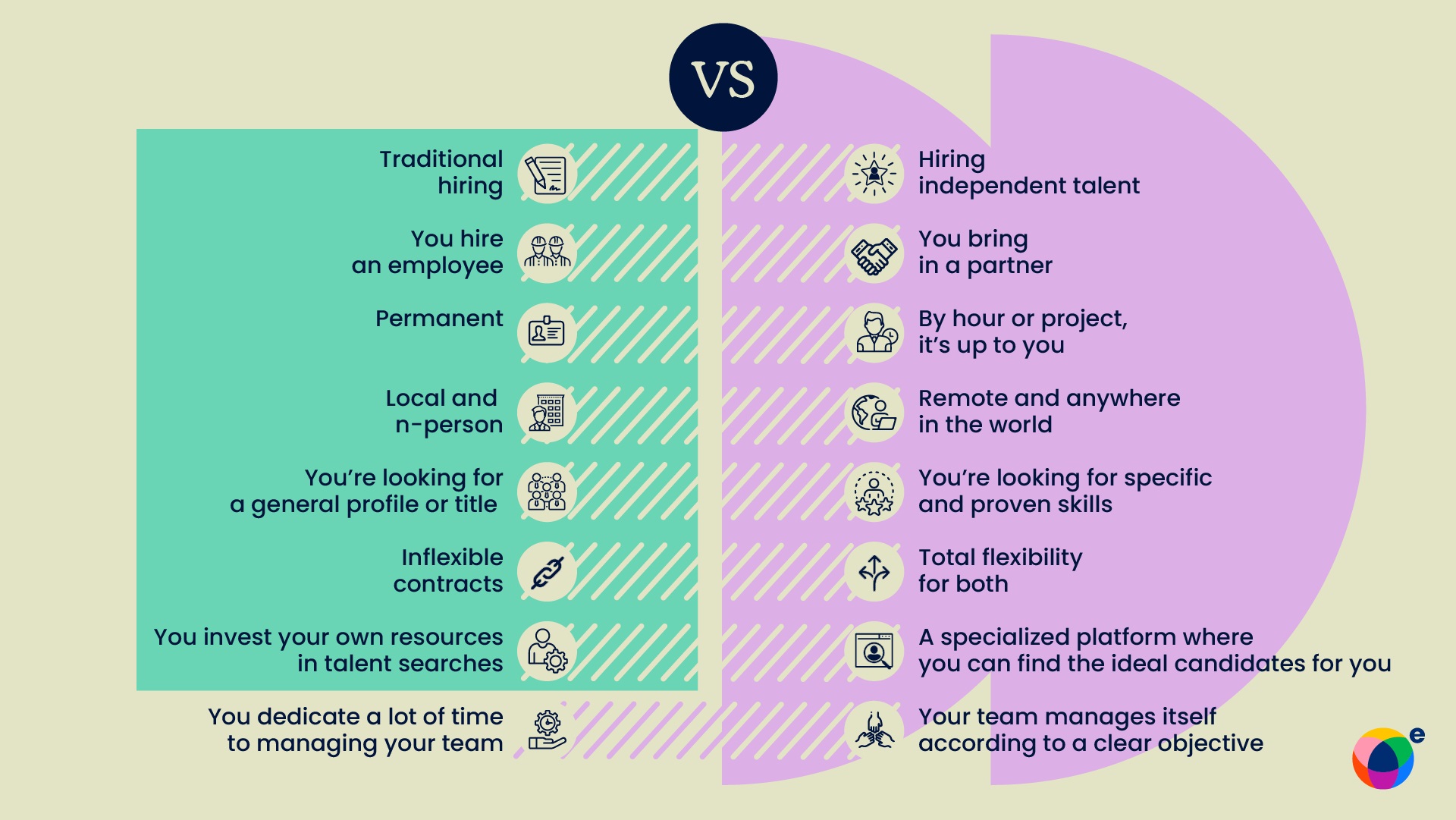In the past few years, there’s no doubt that your company, business, or startup has definitely adapted to a lot of changes…so, if we don’t work now like we did before, why are we still using the same hiring methods?
The consequences of the pandemic continue to have massive impacts the labor market with significant effects like “the Great Resignation,” but the reality is that this paradigm shift in the work world has already been happening for several years. Recent events just sped this shift up.
In 2019, over half of Google’s team consisted of freelancers, and 30% of Fortune 500 companies relied on independent talent.
With the growth of remote work, automation, and other technological advances, a lot of companies no longer need an army of full-time employees to keep growing. They need partners with key skills that will help them solve problems in the here and now and create more efficient ways to operate.
A lot of professionals are unwilling to go back to the traditional model. Instead, they’re looking for ways to gain experience on challenging products while maintaining their autonomy.
As a result, competition for talent is stiffer and more dynamic than ever. To adapt to this new reality, it’s in your best interests to use the trends that are transforming the work world to your advantage:
Contingent labor
This refers to when companies hire extra seasonal staff but keep the rest of their full-time staff at a minimum for the rest of the year. For example, an online store might hire virtual assistants to help with customer service during a hot sale.
Employee sharing
When an employee is hired jointly by several companies resulting in a full-time job, this is called employee sharing. For example, three companies invest in one web designer or network architect.
Job sharing
This is when an employer hires a group of workers that work as a team on a specific job combining different skills part-time as the equivalent of a full-time position. The advantage is access to a lot more strategic skills at the same cost.
Interim Management
This means hiring a professional with a lot of experience to tackle a temporary situation or solve a specific problem. For example a labor law specialist may be hired to make staffing adjustments or a software expert might be hired to train a company’s team.
Scrow employment
This refers to virtual platforms that mediate between an employer and a remote worker in order to ensure that the work and payment are completed on time and payment.
Hybrid teams
These are companies that combine full-time employees and freelancers. For example a company might have their own full-time sales team and hire a data analyst on an hourly basis to help the team make better decisions.
Independent talent is also relying on:
Portfolio work
This is the freelancer model par excellence where a freelancer has a long list of clients and does piecemeal projects for each of them. For example a designer might receive a lot of frequent but small orders from different companies.
ICT-based mobile work
This is the digital nomad’s work model. Not only do they work outside the office, they can work from anywhere in the world thanks to mobile technology.
Collaborative employment
This happens when different freelancers join forces to render more attractive services for companies. For example a web designer and app developer that offer interconnected websites and mobile apps.
More flexible hiring, more efficient societies
These changes in the labor market are very attractive for companies mainly because they save money and grant flexibility without sacrificing the quality of work. What’s more, independent talent is characterized by constantly updating skills.
By participating in the new work paradigm shift, you also become an agent of positive change in your industry and society as a whole. Decentralizing work has been shown to:
- Increase productivity and urban mobility
- Decrease carbon footprints
- Allocate more space for homes instead of offices
- Mitigate overpopulation in big cities
- Improve economies in underserved areas
At Workana Enterprise, you can enjoy all the benefits of all the new hiring methods. We’re the most experienced and successful freelance platform in Latin America. We’ve become a consulting firm that’s tailor-made to meet the needs of the region’s companies and professionals.
The talent you need is ready to get down to business. Take the lead in your industry by joining forces with people who will help you grow and thrive.
—
You may also be interested:








